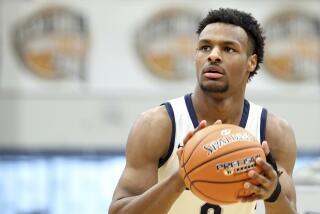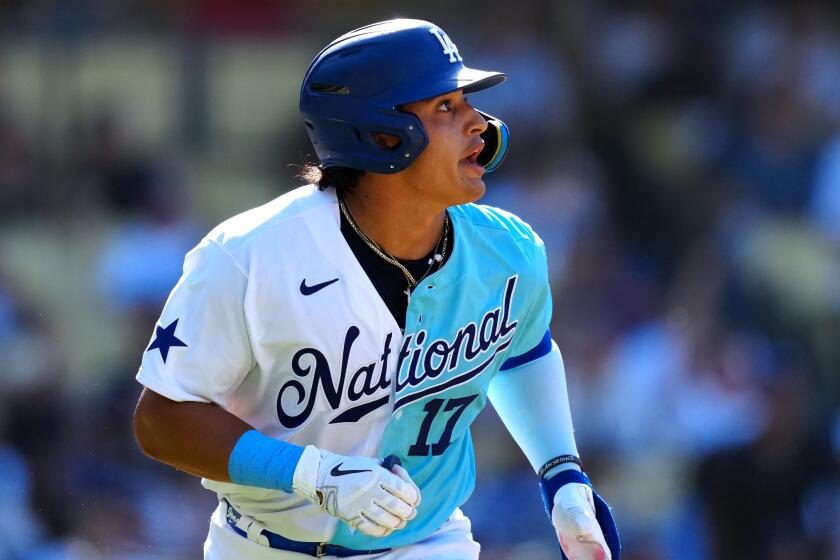Fabrice Muamba remains in critical condition after collapsing
LONDON -- Bolton player Fabrice Muamba was still fighting for his life in intensive care on Sunday night, remaining in critical condition a day after collapsing during a match because of a cardiac arrest.
The 23-year-old midfielder’s heart only started beating on its own when he arrived at a London hospital on Saturday night from Tottenham’s ground, medics said, after having fallen face down on the turf just before halftime.
Amid an outpouring of global concern for Muamba’s health — from FIFA executives to players at rival clubs — members of the Bolton management team, relatives and friends visited him at London Chest Hospital.
About 24 hours after Muamba’s collapse was screened live to a worldwide television audience, Bolton said he remained anesthetized, adding that no further statements would be provided until Monday.
“Everybody is praying for Fabrice, which is very important, and that has been a real source of strength to the family,” Bolton Manager Owen Coyle said outside the hospital. “It’s great to be talented at football but it is more important to be a genuinely nice man, and Fabrice is that. We certainly hope he comes through this.
“Our concern is Fabrice and Fabrice only, and that’s what all our energy is going into — hopefully a happy outcome.”
Muamba collapsed in the 41st minute of the FA Cup match at White Hart Lane, and paramedics immediately began trying to revive him near the halfway line.
“Fabrice received prolonged resuscitation at the ground and on route to the London Chest Hospital, where his heart eventually started working,” Bolton said in a joint statement with the hospital on Sunday morning. “As is normal medical practice, Fabrice remains anesthetized in intensive care and will be for at least 24 hours.”
That rapid treatment was available for Muamba at White Hart Lane was the result of changes brought in following a serious head injury to Chelsea goalkeeper Petr Cech in 2006, with paramedics and an ambulance now on hand at matches.
But uncertainty lingered on Sunday about the causes of the cardiac arrest for Muamba, who was described by former Birmingham manager Steve Bruce as “one of the fittest players I have managed.”
The Professional Footballers’ Association said there are annual heart screenings for footballers.
“While we have been able to pick up quite a number (of heart defects) and then been able to put them right, it is not always possible,” PFA chief executive Gordon Taylor told The Associated Press. “This sometimes happens to young men and women who would be the last people you would think about having such a defect, and then suddenly it is found out.”
Dr. Graham Stuart, a Football Association-accredited cardiologist, said detecting heart defects can be problematic.
“Usually in these cases the reason for this happening is something to do with a heart muscle problem or there is a weakness in the heart muscle,” he said. “It could also be a primary arrhythmia disorder — that is where there is an irregularity in the heart of the ionic channels.”
Clive Clarke collapsed because of a cardiac arrest at halftime of a 2007 match while playing for Leicester at Nottingham Forest. He fully recovered, although he never played again.
“They know it was a cardiac arrest but don’t know exactly what brought it on,” Clarke told the BBC. “I have now got an internal defibrillator that was fitted while I was at hospital, which hopefully prevents my heart stopping again.”
Bolton experienced a similar medical trauma in 2004 when retired Senegal striker Khalilou Fadiga collapsed on the pitch before a League Cup game, also against Tottenham. He returned to training 11 days after undergoing surgery to treat a heart problem that required an automatic defibrillator to be implanted, and later returned to action.
Bolton chairman Phil Gartside urged fans around the world “to keep Fabrice in their prayers” in the hope of a similar recovery.
On Sunday, fans left flowers, Muamba shirts and scarves at Bolton’s Reebok stadium, while there were public displays of support in grounds across Europe.
Former Bolton defender Gary Cahill celebrated scoring his first Chelsea goal in an FA Cup match against Leicester by unveiling a “Pray 4 Muamba” T-shirt. In the Spanish capital, Real Madrid players donned “Get well soon Muamba” tops before kickoff against Malaga.
FIFA President Sepp Blatter said on Twitter: “Shocked to hear about Fabrice Muamba. My thoughts are with him and his family, his club & loved ones at this difficult time.”
As Muamba’s teammates try to deal with the shock, their game against Aston Villa in the Premier League on Tuesday has been postponed.
“I have worked with Fabrice as a player at Birmingham and he has always been a terrific lad, nothing other than the perfect professional,” Villa Manager Alex McLeish said. “He trained every day the way he went to play in games, full of intensity and enthusiasm. He is a manager’s dream in terms of his commitment to the team … the massive response throughout Europe and the world of football underlines how everybody has been touched by this tragic development.”
Fabrice Ndala Muamba was born in what was then called Zaire on April 6, 1988. His father, Marcel, was forced to flee to England before the rest of his family from what is now called Congo amid a civil war. He had worked for the regime of Mobutu Sese Seko, who was overthrown as president in 1997.
The rest of his family, including Fabrice, joined him in England in 1999 after they were granted asylum.
Reflecting on his troubled upbringing last year, Muamba said: “It’s Africa, isn’t it? That’s the type of continent it is. There are always dramas, wars and stuff.”
His road to a professional footballing career started when he joined Arsenal’s youth academy in 2002.
He made his debut at age 17 on Oct. 25, 2005, in the League Cup at Sunderland, and was loaned to Birmingham in the League Championship the following season. The loan was made permanent in May 2007, and he made his Premier League debut for Birmingham in 2007-08 before joining Bolton in June 2008 in a deal worth more than 5 million pounds ($8 million).
Muamba, a father of one, has been part of England’s youth team system and was a member of its team at last year’s European Under-21 Championship. He came on as a substitute against Ukraine and started against the Czech Republic.
More to Read
Go beyond the scoreboard
Get the latest on L.A.'s teams in the daily Sports Report newsletter.
You may occasionally receive promotional content from the Los Angeles Times.










